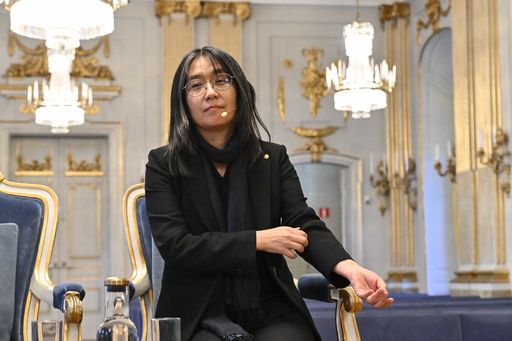STOCKHOLM — The recent announcement of martial law in South Korea has left author Han Kang, the recipient of this year’s Nobel Prize in Literature, feeling stunned. Han expressed her reaction during a press conference in Stockholm, where she addressed the political unrest unfolding in her homeland.
Recognized by the Nobel committee for her “intense poetic prose that confronts historical traumas and exposes the fragility of human life,” Han reflected on the deep historical context of her work. She noted that her novel “Human Acts” draws from events surrounding the martial law enacted in 1979, particularly the tragic incidents in 1980 in her hometown of Gwangju, where a violent suppression of pro-democracy demonstrations resulted in numerous casualties.
During her remarks, she conveyed the profound impact of witnessing modern-day martial law being enacted in real-time after the president’s unexpected late-night broadcast on Tuesday. This latest development has stirred memories of South Korea’s oppressive military regimes, resonating powerfully with the collective experience of its citizens.
“I was profoundly shocked, just like everyone else that evening,” the 54-year-old author shared through a translator. “To see a similar scenario unfold in 2024 was truly unsettling.”
Han, who is known for her thought-provoking and often unsettling narratives that delve into themes of human trauma and violence, continues to make a mark as the first South Korean laureate of the prestigious literary prize.
In response to the martial law declaration, President Yoon Suk Yeol deployed heavily armed troops onto the streets of Seoul; however, he was compelled to revoke his order within hours due to pressure from the assembly, which is now considering the possibility of impeaching him.
Opposition groups are advocating for a vote on an impeachment motion scheduled for Saturday. This motion requires a two-thirds majority in the National Assembly to proceed to the Constitutional Court, which would determine whether President Yoon should be removed from his position.
Coincidentally, Saturday marks the day Han will present her Nobel lecture in Stockholm, followed by a ceremony and banquet honoring her along with other laureates on December 10, the day marking Alfred Nobel’s death.
Despite the turbulent events occurring around the globe, Han Kang conveyed her joy regarding her Nobel achievement, albeit with a sense of quiet reflection. Through her translator, she articulated the impacts of current global issues on her mindset. “There are moments I question: is there hope left for us?” she mused, finally concluding that “hoping for hope is a form of hope in itself.”



